八年级英语下册第一单元重点句型汇总(人教版)
最全面人教版八年级下册英语第一单元知识点归纳总结

Unit 1 What's the matter?一、词汇与短语◆重点单词A部分1.matter n. 问题;事情2.sore adj. 疼痛的;酸痛的3.stomachache n. 胃痛;腹痛4.foot n. 脚;足5.neck n. 颈;脖子6.stomach n. 胃;腹部7.throat n. 咽喉;喉咙8.hurt v. (使)疼痛;受伤9.fever n. 发烧10.passenger n. 乘客;旅客11.lie v. 躺;平躺12.break n. 间歇;休息13.rest v. &n. 放松;休息14.onto prep. 向;朝15.X-ray n. X射线;X光16.trouble n. 问题;苦恼17.toothache n. 牙痛18.hit n. (用手或器具)击;打19.headache n. 头痛20.herself pron. (she的反身代词)她自己21.off adv. & prep. 离开(某处);不工作;从……去掉B部分1.bandage n. 绷带v. 用绷带包扎2.press v. 压;挤;按3.sick adj. 生病的;有病的4.knee n. 膝;膝盖5.breathe v. 呼吸6.knife n. 刀7.sunburned adj. 晒伤的8.blood n. 血9.ourselves pron. (we反身代词)我们自己10.mean v. 意思是;打算11.climber n. 登山者;攀登者12.importance n. 重要性;重要13.risk n.&v. 危险;风险;冒险14.decision n. 决定;抉择15.accident n.(交通)事故;意外遭遇16.control v.&n. 限制;约束;管理17.situation n. 情况;状况18.spirit n. 勇气;意志19.kilo( = kilogram) n. 千克;公斤20.death n. 死;死亡21.rock n. 岩石22.nurse n. 护士◆重点短语A部分1.have a cold 感冒2.lie down 躺下3.have a stomachache 胃痛4.take one's temperature 量体温5.have a fever 发烧6.to one's surprise 使……惊讶的是7.get off 下车8.right away 立即;马上9.take breaks (take a break) 休息10.talk too much 说得太多11.drink enough water 喝足够的水12.have a very sore throat 嗓子非常疼13.get an X-ray 拍X光片14.see a dentist 看牙医15.drink some hot tea with honey 喝一些加蜂蜜的热茶16.put some medicine on sth.在……上面敷一些药17.feel very hot 感到很热18.sound like 听起来像19.all weekend 整个周末20.in the same way 以同样的方式21.go to a doctor 看医生22.go along 沿着……走23.on the side of the road 在马路边24.shout for help 大声呼救25.without thinking twice 没有多想26.have a heart problem 有心脏病27.thanks to 多亏了;由于28.in time 及时29.save a life 挽救生命30.get into trouble 陷入麻烦31.hurt oneself 受伤32.fall down落下;摔倒B部分1.be used to 习惯于……;适应于……2.in a difficult situation 在困境中3.take risks (take a risk) 冒险4.keep on doing sth. 继续(或坚持)做某事5.run out (of) 用尽;耗尽6.make a decision 作出决定7.cut off 切除8.get hit on the head 撞到头部9.get out of 离开;从……岀来10.be interested in 对……感兴趣11.give up 放弃12.mean doing sth. 意味着做某事13.put a bandage on sth. 用绷带包扎…14.lose one's life 失去生命15.feel sick 感到恶心16.mountain climbing 登山运动17.have problems breathing 呼吸困难18.be in control of 掌管;管理◆重点句子A部分1.What's the matter with you?=What's the trouble with you?=What's wrong with you?你怎么了?2.What should she do? 她该怎么办呢?3.Did you fall down? 你跌倒了吗?4.Should I take my temperature? 我应该量一下体温吗?5.I think I sat in the same way for too long without moving.我想我以同样的姿势一动不动地坐得太久了。
(完整版)新版人教版八年级英语下册第一单元重点知识点汇总
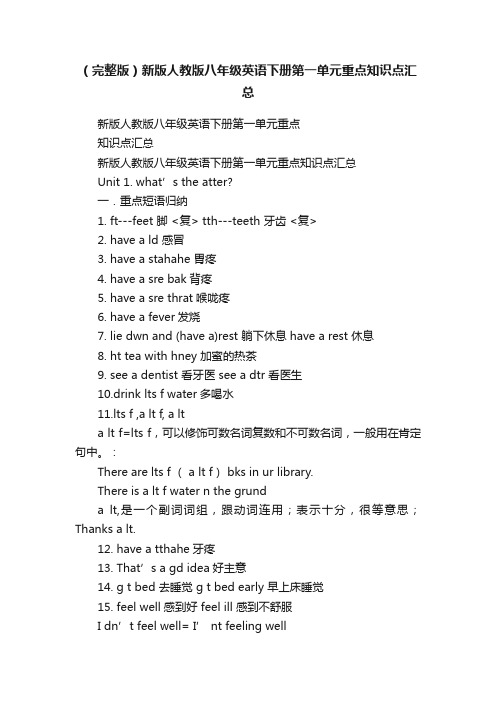
(完整版)新版人教版八年级英语下册第一单元重点知识点汇总新版人教版八年级英语下册第一单元重点知识点汇总新版人教版八年级英语下册第一单元重点知识点汇总Unit 1. what’s the atter?一.重点短语归纳1. ft---feet 脚 <复> tth---teeth 牙齿 <复>2. have a ld 感冒3. have a stahahe 胃疼4. have a sre bak背疼5. have a sre thrat喉咙疼6. have a fever发烧7. lie dwn and (have a)rest 躺下休息 have a rest 休息8. ht tea with hney 加蜜的热茶9. see a dentist 看牙医 see a dtr 看医生10.drink lts f water多喝水11.lts f ,a lt f, a lta lt f=lts f,可以修饰可数名词复数和不可数名词,一般用在肯定句中。
:There are lts f ( a lt f) bks in ur library.There is a lt f water n the grunda lt,是一个副词词组,跟动词连用;表示十分,很等意思;Thanks a lt.12. have a tthahe牙疼13. That’s a gd idea好主意14. g t bed 去睡觉 g t bed early 早上床睡觉15. feel well感到好 feel ill 感到不舒服I dn’t feel well=I’ nt feeling well我感觉不舒服.16. start ding/ t d sth开始做某事T D 是一件事情完成了,开始做另外一件事情DING是原的那件事情做到一半,现在又开始做了,是同一件事情。
17. tw days ag两天前18. get se rest 多休息, 休息一会儿19. I think s我认为是这样20. be thirsty口渴21. be hungry 饥饿22. be stressed ut紧张23. listen t usi听音乐24. healthy lifestyle健康的生活方式25. traditinal hinese dtrs传统中医26. need t d sth 需要做某事I have a tthahe. I need t see a dentist. 我牙痛, 我需要去看牙医.e need t keep ur lassr lean. 我们需要保持教室的干净.27. a balane f yin and yang阴阳平衡28. fr exaple例如29. t uh yin太多的阴, 阴气太盛t uh + 不可数名词太多的…uh t +形/副实在太…极其,非常t any + 可数名词复数太多的…30.be gd fr sth./ ding sth. 对什么有益,对什么有好处be bad fr sth./ ding sth. 对什么有害be gd t 对…好be gd at =d well in 在……方面好,擅长be gd(bad) fr、be gd at的相关用法1.be gd fr 对......有益Ding rning exerises is gd fr yur health.做早操对你们的建康有益。
人教版八年级英语下册第一单元知识点汇总

人教版八年级英语下册第一单元知识点汇总Unit 1: Where did you go on vacation?第一单元:你去过哪里度假?I. Vocabulary(词汇)1. vacation (n.) - a period of time when you are not working or studying, especially one spent traveling or doing enjoyable things.(假期)2. destination (n.) - a place to which someone is going or where something is being sent or taken.(目的地)3. explore (v.) - to travel to a new place in order to learn about it or to search and discover new things.(探索)4. souvenir (n.) - something that you buy or keep to remind you of a special place or trip(纪念品)5. sightseeing (n.) - the activity of visiting interesting places, especially as tourists(观光)6. fascinating (adj.) - extremely interesting or attractive(迷人的)7. relaxing (adj.) - helping you to rest and become less anxious or tense (放松的)II. Grammar(语法)1. Simple Past Tense(一般过去时)- Used to talk about completed actions or events in the past.- Regular verbs: add -ed to the base form of the verb. Example: walked, talked.- Irregular verbs: do not follow the regular pattern. Example: went, ate.2. Adverbs of Frequency(频度副词)- Used to show how often something happens.- Examples: always, sometimes, often, rarely, never.III. Sentence Structure(句子结构)1. Questions with "Where"(带有"Where"的疑问句)- Used to ask about the location or place.- Example: Where did you go on vacation?2. Answers with "I went to..."(回答时使用"I went to...")- Used to respond to a question about where someone went on vacation.- Example: I went to the beach.IV. Communication(交际)1. Asking for and giving information(询问和提供信息)- Used to ask about and provide details of a vacation.- Example: A: Where did you go on vacation? B: I went to Paris.2. Expressing preferences(表达偏好)- Saying what you like or dislike about a vacation.- Example: I liked the food in Italy, but I didn't enjoy the crowded streets.V. Culture Corner(文化角落)1. Different types of vacations(不同类型的度假方式)- Beach vacation: spending time at the beach and enjoying the sun and sea.- Safari vacation: going on a wildlife adventure in natural reserves.- City vacation: exploring cities and visiting famous landmarks.- Mountain vacation: enjoying outdoor activities in mountainous regions.- Cultural vacation: immersing yourself in the local culture and traditions.总结:本单元主要学习了与度假相关的词汇以及过去式的用法。
新人教版英语八年级下册Unit1必背短语与句型
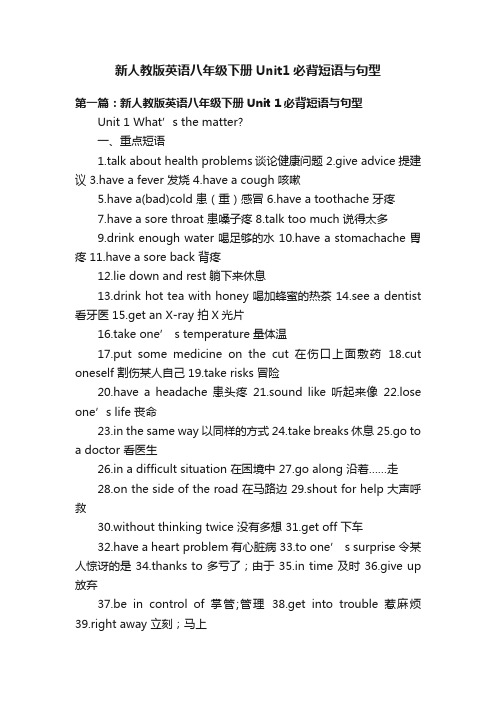
新人教版英语八年级下册Unit1必背短语与句型第一篇:新人教版英语八年级下册Unit 1必背短语与句型Unit 1 What’s the matter?一、重点短语1.talk about health problems谈论健康问题2.give advice 提建议3.have a fever 发烧4.have a cough 咳嗽5.have a(bad)cold 患(重)感冒6.have a toothache 牙疼7.have a sore throat 患嗓子疼 8.talk too much 说得太多9.drink enough water 喝足够的水 10.have a stomachache 胃疼 11.have a sore back 背疼12.lie down and rest 躺下来休息13.drink hot tea with honey 喝加蜂蜜的热茶 14.see a dentist 看牙医 15.get an X-ray 拍X光片16.take one’ s temperature 量体温17.put some medicine on the cut 在伤口上面敷药18.cut oneself 割伤某人自己 19.take risks 冒险20.have a headache 患头疼21.sound like 听起来像22.lose one’s life 丧命23.in the same way 以同样的方式 24.take breaks 休息 25.go toa doctor 看医生26.in a difficult situation 在困境中 27.go along 沿着……走28.on the side of the road 在马路边 29.shout for help 大声呼救30.without thinking twice 没有多想 31.get off 下车32.have a heart problem 有心脏病33.to one’ s surprise 令某人惊讶的是 34.thanks to 多亏了;由于 35.in time 及时 36.give up 放弃37.be in control of 掌管;管理38.get into trouble 惹麻烦39.right away 立刻;马上40.because of+n.pron.由于…… 41.get out of 从……出来42.hurt oneself 受伤 43.fall down 摔倒44.put a bandage on sth.用绷带包扎…… 45.run it under water 在水流下冲洗46.keep on doing sth.继续或坚持做某事47.have a nosebleed 流鼻血 48.run out(of)用完;用尽49.put your head back 把你的头向后仰 50.make a decision 做出决定 51.rest for a few days 休息几天52.get hit on the head 头部挨打53.have problems breathing 呼吸困难 54.get hit by a ball 被球击中 55.get sunburned 晒伤56.go mountain climbing 去爬山57.as a mountain climber 作为一名登山者 58.be used to doing sth.习惯做某事 59.be used to taking risks习惯于冒险60.cut off half his right arm 切除半边右臂 61.so that 以便62.so...that 如此… …以至于…二、重点句型1.What’ s the matter∕the trouble(with you)? = What’ s wrong with you?你怎么了?2.You shouldn’t eat so much next time.下次你不应该吃这么多。
人教版英语八年级下册重点词组句型及语法点汇总

⼈教版英语⼋年级下册重点词组句型及语法点汇总⼀、重点词组1. have a fever / cough / cold 发烧/咳嗽/感冒2. have a toothache / stomachache ⽛疼/胃疼3. have a sore back / throat 背疼/喉咙痛4. talk too much 说得太多5. drink enough water 喝⾜够的⽔6. lie down 躺下7. drink hot tea with honey 喝加蜂蜜的热茶8. see a dentist 看⽛医9. get an X-ray 拍X 光⽚10. take one’s temperature 量体温11. put some medicine on sth. 在……上⾯敷药12. all weekend 整个周末13. take breaks (=take a break) 休息14. in the same way 以同样的⽅式15. go to a doctor=see a doctor 看医⽣16. go along 沿着……⾛17. shout for help ⼤声呼救18. without thinking twice 没有多想19. get off 下车20. have a heart problem 有⼼脏病21. to one’ s surprise 使……惊讶的;22. expect sb to do 期待某⼈做某事23. wait for 等待24. agree to do 同意做某事25. thanks to 多亏了;由于29. in time 及时30. save a/one’s life 挽救⽣命31. help others 帮助别⼈32. think about 考虑;认为33. right away ⽴刻;马上34. get into trouble 造成⿇烦(或烦恼)35. fall down 跌落36. mountain climbing 登⼭运动37. lose one’s life 失去⽣命38. (be) in a difficult situation 在困境中39. by oneself 由某⼈⾃⼰40. run out (of) ⽤完;耗尽41. cut off 切除42. climb down 爬下43. get out of 离开;从……出来44. make a decision=make decisions 做出决定45. be in control of 掌管;管理47. take risks (take a risk) 冒险⼆、常见搭配1. too much 太多1> 修饰不可数名词2> 修饰动词,表⽰程度22. shout back ⼤声回应23. walk away ⾛开24. in surprise 惊讶地25. share the housework 分担家务26. hang out 闲逛27. do chores 做杂务28. go to the store去商店29. buy drinks and snacks 买饮料和点⼼30. make sb. do sth. 使某⼈做某事31. have enough stress from 有来⾃…⾜够的压⼒32. a waste of time浪费时间33. in order to为了34. get good grades 取得好成绩35. depend on 依赖;依靠36. have no idea 不知道37. develop children’s independence发展孩⼦独⽴性38. look after=take care of 照顾;照看39. as a result 结果40. agree with sb 同意某⼈的观点/意见disagree with sb 不同意某⼈的观点/意见⼆、常见搭配1. finish doing sth. 完成做某事2. a few “⼏个”,后接可数名词复数few “很少,⼏乎没有”,后接可数名词复数a little “⼀点⼉”,后接不可数名词little “很少,⼏乎没有”,后接不可数名词3. 1> question “问题”,需要回答的问题,与ask或answer搭配2> problem “问题”,需要解决的问题,与solve搭配4. in front of “在…前⾯”,在所说范围之外in the front of “在…前⾯”,在所说范围之内5. as…as…“与…⼀样…”,中间加形容词或副词原级,。
Unit1必背短语人教版英语八年级下册
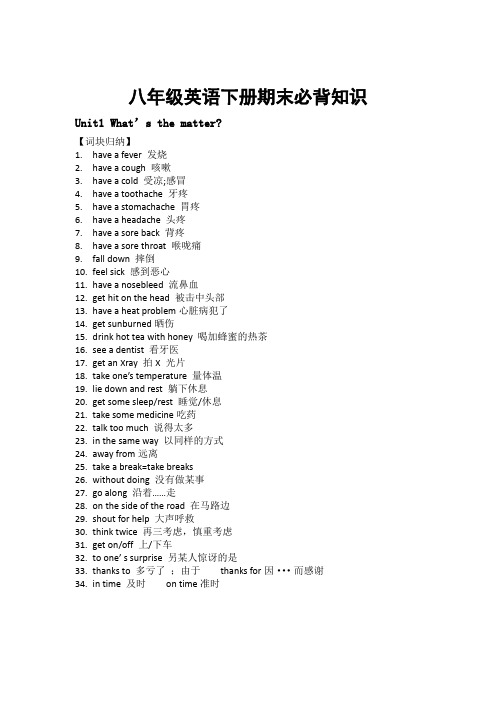
八年级英语下册期末必背知识Unit1 What’s the matter?【词块归纳】1.have a fever 发烧2.have a cough 咳嗽3.have a cold 受凉;感冒4.have a toothache 牙疼5.have a stomachache 胃疼6.have a headache 头疼7.have a sore back 背疼8.have a sore throat 喉咙痛9.fall down 摔倒10.feel sick 感到恶心11.have a nosebleed 流鼻血12.get hit on the head 被击中头部13.have a heat problem心脏病犯了14.get sunburned晒伤15.drink hot tea with honey 喝加蜂蜜的热茶16.see a dentist 看牙医17.get an Xray 拍X 光片18.take one’s temperature 量体温19.lie down and rest 躺下休息20.get some sleep/rest 睡觉/休息21.take some medicine吃药22.talk too much 说得太多23.in the same way 以同样的方式24.away from远离25.take a break=take breaks26.without doing 没有做某事27.go along 沿着……走28.on the side of the road 在马路边29.shout for help 大声呼救30.think twice 再三考虑,慎重考虑31.get on/off 上/下车32.to one’ s surprise 另某人惊讶的是33.thanks to 多亏了;由于thanks for因···而感谢34.in time 及时on time准时35.make a decision 做出决定36.get into trouble 陷入困境37.right away=right now=at once 立刻;马上ed to do sth. 过去常常做某事be used to doing sth. 习惯于做某事be used to do sth. 被用来做某事39.run out (of) 用完;耗尽40.cut down 砍倒;砍伐cut off 切除cut up切碎41.be in control of 掌管;管理42.give up doing sth. 放弃做某事43.because of 因为;由于44.take a risk =take risks冒险45.get out of 离开,从……出来46.keep on doing sth.继续或坚持做某事47.in a difficult situation 在困境中in trouble在困境中48.mountain climbing 登山运动49.the importance of······的重要性50.give up (doing) 放弃(做)51.by accident意外地,偶然【用法总结】1.What's the matter with you?= What's the trouble with you?= What's wrong with you? 你怎么了?2.need to do sth 需要做某事3.agree to do sth 同意做某事4. see sb doing sth 看见某人正在做某事see sb do sth 看见某事做了某事/看见某人经常做某事5.expect sb to do sth. 期待某人做某事6.It’s +adj.+that从句···是···的7.tell sb.(not) to do sth 叮嘱/吩咐某人(不要)做某事8.have trouble/difficulty/problems (in) doing sth. 做某事有困难9.be ready to do sth.准备好做某事,乐意做某事10. so that 以便so...that...如此……以至于…11.mind doing sth.介意做某事。
人教版英语八年级下学期第一单元短语梳理

人教版英语八年级下学期第一单元短语梳理1.too much 太多2.lie down 躺下3.get an X-ray 做个X光检查4.take one ’s temperature 量体温5.put some medicine on ......在....上敷药6.have a fever 发烧7.take breaks /take a break 休息8.without thinking twice 没多想9.get off 下车10.take sb to the hospital 送某人去医院11.wait for等待12.to one’s surprise 使.......惊讶的13.thanks to多亏于;由于14.in time及时15.think about 考虑16.have a heart problem患有心脏病17.get into the trouble 遇到麻烦18.do the right thing做正确的事情事情19.fall down 摔倒20.put ...... on sth把...放在某物上21.get hit/sunburned 摔伤/烧伤22.be interested in 对.....感兴趣23.be used to 习惯于.... 24.take risks/take a risk 挑战25.lose one’s life 失去生命26.because of 因为27.run out of 用完28.cut off 切除29.get out of 从...出来30.make a decision/decisions 做决定31.be in control of 掌管;管理32.give up 放弃33.need to do sth .需要去做某事34see sb doing sth 看见某人正在做某事35.ask sb about sth 询问某人某事36.expect sb to do sth 期望某人做某事37.agree to do sth 想要做某事38.help sb (to) do sth 帮助某人做某事39.want to do sth 想要做某事40.tell sb to do sth 告诉某人做某事41.have problems(in) doing sth 做某事有困难e sth to do sth用某物去做某事43.be/get used to doing sth 习惯于做某事44.seem to do sth 好像做某事45.keep on doing sth 继续做某事46.mind doing sth 介意做某事47.fall on落在……上48.Between a rock and a Hard Place生死两难49.after this experience 这次经历之后50.good decisions好决定51.half his right arm他的半支右臂52.get hit by a ball被球击中53.ask for 询问,请求41.have problems(in) doing sth 做某事有困难e sth to do sth用某物去做某事43.be/get used to doing sth 习惯于做某事44.seem to do sth 好像做某事45.keep on doing sth 继续做某事46.mind doing sth 介意做某事47.fall on落在……上48.Between a rock and a Hard Place生死两难49.after this experience 这次经历之后50.good decisions好决定51.half his right arm他的半只右臂52.get hit by a ball被球击中53.ask for 询问,请求。
(完整版)人教版八年级英语下册Unit1知识点讲解(可编辑修改word版)

Unit 1 重点知识讲解Grammar一、情态动词(Modal Verbs)情态动词should 意为“应该,应当”,必须和后面的动词原形一起构成谓语,没有人称和数的变化。
用以表达职责和义务、提出劝告,而且表述的是自己的主观看法。
1.should 的句式结构2.s hould 的用法喜或在说话人看来是不可思议的。
二、其他表示建议的句型表示反射或强调的代词叫做反身代词。
反身代词是由第一人称、第二人称形容词性物主代词或第三人称代词的宾格形式,词尾加self 或selves 组成。
反身代词可译“本人”、“本身”,为加强语气,也常翻译为“亲自”、“自己”。
不定人称代词one ---- oneself.1、反身代词的分类2、反身代词的用法单词的用法Section A1.What’s the matter?怎么了?该句常用询问某人患了何种疾病或遇到了什么麻烦,其后用with 引出对象。
1). What’s the matter with sb.?=what’s wrong with sb.?=what’s the trouble/problem with sb.?=what’s one’s trouble/problem?e.g. What’s the matter with Tom?=what’s with Tom?=What’s the with Tom?=What’s Tom’s?2). matter, 名词,“问题,事情”e.g. We have important (matter) to discuss.我们有些重要的问题要讨论。
3). 动词,“要紧,关系重大”e.g. It dosen’t that you came late.2.I have a cold.我感冒了。
1).have/get/catch a cold “感冒,着凉”The old man a cold yesterday.那位老人昨天感冒了。
人教版八年级下册英语知识点总结(完整版)
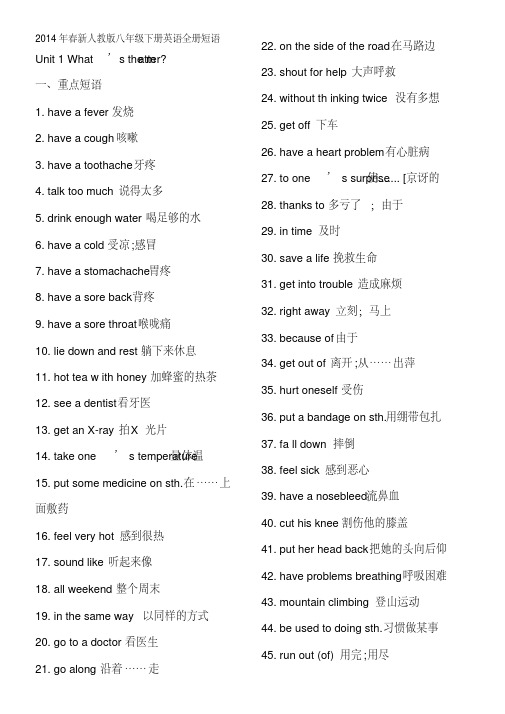
2014年春新人教版八年级下册英语全册短语Unit 1 What’s the matter?一、重点短语1. have a fever 发烧2. have a cough 咳嗽3. have a toothache 牙疼4. talk too much 说得太多5. drink enough water 喝足够的水6. have a cold 受凉;感冒7. have a stomachache 胃疼8. have a sore back 背疼9. have a sore throat 喉咙痛10. lie down and rest 躺下来休息11. hot tea w ith honey 加蜂蜜的热茶12. see a dentist 看牙医13. get an X-ray 拍X 光片14. take one’ s temperature量体温15. put some medicine on sth. 在……上面敷药16. feel very hot 感到很热17. sound like 听起来像18. all weekend 整个周末19. in the same way 以同样的方式20. go to a doctor 看医生21. go along 沿着……走22. on the side of the road 在马路边23. shout for help 大声呼救24. without th inking twice 没有多想25. get off 下车26. have a heart problem 有心脏病27. to one’ s surprise使....... [京讶的28. thanks to 多亏了;由于29. in time 及时30. save a life 挽救生命31. get into trouble 造成麻烦32. right away 立刻;马上33. because of 由于34. get out of 离开;从……出萍35. hurt oneself 受伤36. put a bandage on sth. 用绷带包扎37. fa ll down 摔倒38. feel sick 感到恶心39. have a nosebleed 流鼻血40. cut his knee 割伤他的膝盖41. put her head back 把她的头向后仰42. have problems breathing 呼吸困难43. mountain climbing 登山运动44. be used to doing sth. 习惯做某事45. run out (of) 用完;用尽46. so that 以便47. so. . . that 如此……以至于…48. be in control of 掌管;管理49. in a difficult situation 在闲境屮50. keep on doing sth. 继续或坚持做某事51. make a decision 做出决定52. take risks 冒险53. give up 放弃二、重点句型1. What’ s the matter?What’ s the matter with you?= What’s the trouble w ith you?= What’ s wrong with you?你怎么了?2. What should she do?她该怎么办呢?Should I take my temperature?我应该量一下体温吗?主语+ should/shouldn’t + 动词原形. ..①You should lie down and rest.你应该躺下休息一会儿。
新人教版英语八年级下册第一单元总结(词语+词组+句型)(K12教育文档)

新人教版英语八年级下册第一单元总结(词语+词组+句型)(word版可编辑修改)编辑整理:尊敬的读者朋友们:这里是精品文档编辑中心,本文档内容是由我和我的同事精心编辑整理后发布的,发布之前我们对文中内容进行仔细校对,但是难免会有疏漏的地方,但是任然希望(新人教版英语八年级下册第一单元总结(词语+词组+句型)(word版可编辑修改))的内容能够给您的工作和学习带来便利。
同时也真诚的希望收到您的建议和反馈,这将是我们进步的源泉,前进的动力。
本文可编辑可修改,如果觉得对您有帮助请收藏以便随时查阅,最后祝您生活愉快业绩进步,以下为新人教版英语八年级下册第一单元总结(词语+词组+句型)(word版可编辑修改)的全部内容。
总结unit 1What's the matter?一、主题:谈论疾病及意外,给出建议二、词汇:1。
人体器官parts of body1.头 head2.眼睛 eye 3。
鼻子nose4.嘴巴 mouse5.牙齿 teeth(复)tooth(单) 6。
喉咙throat 7.耳朵 ear 8.脖子 neck 9.后背back10.胃 stomach 11.胳膊 arm 12。
胳膊肘 elbow13.手 hand 14.手指 finger 15。
腿 leg16.膝盖knee 17.脚 feet 18。
脚后跟 heel 19。
脚趾toe2。
疾病:感冒 have a (bad)cold发烧 have a (high) fever咳嗽 have a cough头疼 have a head ache牙疼 have a tooth ache胃疼 have a stomach ache喉咙痛have a sore throat背疼 have a sore back3。
短语:说太多话talk too much喝足够水drink enough water躺下休息lie down and rest蜂蜜热茶hot tea with honey看牙医 see a dentist看医生go to a doctor量体温take one’s temperature拍X光片get an X-ray敷药put some medicine on the cut 吃药 take some medicine切伤自己cut oneself弄伤自己 hurt oneself间歇休息 take a break远离… be/keep away from同一姿势坐太久sit in the same way for too long 沿着…走 go along…在…的一边on the side of.。
人教版英语八年级下册第1单元重点知识汇总
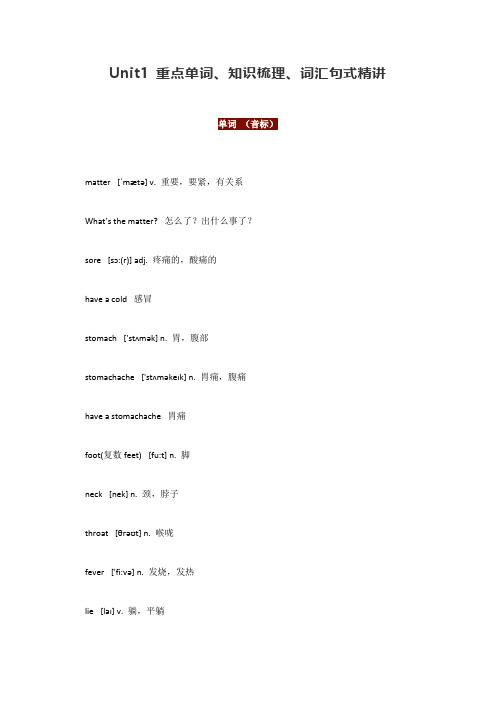
Unit1 重点单词、知识梳理、词汇句式精讲matter [ˈmætə] v. 重要,要紧,有关系What’s the matter? 怎么了?出什么事了?sore [sɔ:(r)] adj. 疼痛的,酸痛的have a cold 感冒stomach ['stʌmək] n. 胃,腹部stomachache ['stʌməkeɪk] n. 胃痛,腹痛have a stomachache 胃痛foot(复数feet) [fu:t] n. 脚neck [nek] n. 颈,脖子throat [θrəʊt] n. 喉咙fever ['fi:və] n. 发烧,发热lie [laɪ] v. 躺,平躺lie down 躺下rest [rest] n. 剩余部分,其余;放松,休息cough [kɒf] n. & v. 咳嗽X-ray ['eksreɪ] n. X光,X射线toothache [ˈtu:θeɪk] n. 牙痛take one's temperature 量体温headache [ˈhedeɪk] n. 头痛have a fever 发烧break [breɪk] n. & v. 休息,暂停;打破take breaks (take a break)休息hurt [hə:t] v. 伤害,损害,使受伤,疼passenger ['pæsɪndʒə] n. 乘客,旅客off [ɒf] adv. prep. 离开(某处);从…去掉get off 下车to one's surprise 使…惊讶,出乎…意料onto [ˈɒntə] prep. 向,朝trouble [ˈtrʌbl] n. 麻烦,烦扰,问题hit [hit] n. & v. 碰撞,打,打击right away 立即,马上get into 陷入,参与herself [hə:ˈself]她自己,她本身(she的反身代词)bandage ['bændɪdʒ] n. & v. 绷带;用绷带包扎sick [sɪk] adj. 患病的,不适的knee [ni:] n. 膝盖nosebleed [ˈnəʊzbli:d] n. 鼻出血breathe [bri:ð] v. 呼吸sunburned [ˈsʌnbɜ:nd] adj. 晒伤的ourselves [ɑ:ˈselvz]我们自己(we的反身代词)climber [ˈklaɪmə(r)] n. 登山者be used to 习惯于… 适应于…risk [rɪsk] n. & v. 风险,危险;冒险take risks (take a risk) 冒险accident [ˈæksidənt] n. 意外事件;事故situation [ˌsitjuˈeiʃən] n. 状况,形式,情况kg=kilogram [ˈkɪləgræm] n. 公斤,千克rock [rɔk] n. 岩石run out (of) 用尽,耗尽knife [naif] n. 刀,餐刀cut off 切除blood [blʌd] n. 血mean [mi:n] v. 意味着,意思是,意欲get out of 离开,从… 出来importance [ɪmˈpɔ:tns] n. 重要性decision [dɪ'sɪʒn] n. 决心,决定,抉择control [kən'trəʊl] v. 控制,支配,操纵be in control of 掌管,管理spirit ['spɪrɪt] n. 勇气,意志death [deθ] n. 死亡give up 放弃nurse [nə:s] n. 护士Judy 朱迪(女名)Nancy 南希(女名)Mandy 曼迪(女名)Aron Ralston 阿伦·罗尔斯顿Utah 尤他州(美国)Unit1 知识梳理【重点单词】matter [ˈmætə] v. 重要,要紧,有关系What’s the matter? 怎么了?出什么事了?sore [sɔ:(r)] adj. 疼痛的,酸痛的have a cold 感冒stomach ['stʌmək] n. 胃,腹部stomachache ['stʌməkeɪk] n. 胃痛,腹痛have a stomachache 胃痛foot(复数feet) [fu:t] n. 脚neck [nek] n. 颈,脖子throat [θrəʊt] n. 喉咙fever ['fi:və] n. 发烧,发热lie [laɪ] v. 躺,平躺lie down 躺下rest [rest] n. 剩余部分,其余;放松,休息cough [kɒf] n. & v. 咳嗽X-ray ['eksreɪ] n. X光,X射线toothache [ˈtu:θeɪk] n. 牙痛take one's temperature 量体温headache [ˈhedeɪk] n. 头痛have a fever 发烧break [breɪk] n. & v. 休息,暂停;打破take breaks (take a break)休息hurt [hə:t] v. 伤害,损害,使受伤passenger ['pæsɪndʒə] n. 乘客,旅客off [ɒf] adv. prep. 离开(某处);从…去掉get off 下车to one's surprise 使…惊讶,出乎…意料onto [ˈɒntə] prep. 向,朝trouble [ˈtrʌbl] n. 麻烦,烦扰,问题hit [hit] n. & v. 碰撞,打,打击right away 立即,马上get into 陷入,参与herself [hə:ˈself] pron. 她自己,她本身(she的反身代词)bandage ['bændɪdʒ] n. & v. 绷带;用绷带包扎sick [sɪk] adj. 患病的,不适的knee [ni:] n. 膝盖nosebleed [ˈnəʊzbli:d] n. 鼻出血breathe [bri:ð] v. 呼吸sunburned [ˈsʌnbɜ:nd] adj. 晒伤的ourselves [ɑ:ˈselvz] pron. 我们自己(we的反身代词)climber [ˈklaɪmə(r)] n. 登山者be used to 习惯于… 适应于…risk [rɪsk] n. & v. 风险,危险;冒险take risks (take a risk) 冒险accident [ˈæksidənt] n. 意外事件;事故situation [ˌsitjuˈeiʃən] n. 状况,形式,情况kg=kilogram [ˈkɪləgræm] n. 公斤,千克rock [rɔk] n. 岩石run out (of) 用尽,耗尽knife [naif] n. 刀,餐刀cut off 切除blood [blʌd] n. 血mean [mi:n] v. 意味着,意思是,意欲get out of 离开,从… 出来importance [ɪmˈpɔ:tns] n. 重要性decision [dɪ'sɪʒn] n. 决心,决定,抉择control [kən'trəʊl] v. 控制,支配,操纵be in control of 掌管,管理spirit ['spɪrɪt] n. 勇气,意志death [deθ] n. 死亡give up 放弃nurse [nə:s] n. 护士【重点短语】1.have a fever 发烧2.have a cough 咳嗽3.have a toothache 牙疼4.talk too much 说得太多5.drink enough water 喝足够的水6.have a cold 受凉;感冒7.have a stomachache 胃疼8.have a sore back 背疼9.have a sore throat 喉咙痛10. take risks 冒险11.hot tea with honey 加蜂蜜的热茶12.see a dentist 看牙医13.get an X-ray 拍X 光片14.take one’ s temperature 量体温15.put some medicine on sth. 在……上面敷药16. give up 放弃17. sound like 听起来像18. all weekend 整个周末19. in the same way 以同样的方式20. go to a doctor 看医生21. go along 沿着……走22. on the side of the road 在马路边23. shout for help 大声呼救24. without thinking twice 没有多想25. get off 下车26. have a heart problem 有心脏病27. to one’ s surprise 另某人惊讶的是28. thanks to 多亏了;由于29. in time 及时30. make a decision 做出决定31. get into trouble 造成麻烦32. right away 立刻;马上33. because of 由于34. get out of 离开;从……出来35. keep on doing sth. 继续或坚持做某事36. put a bandage on sth. 用绷带包扎37. fall down 摔倒38. feel sick 感到恶心39. have a nosebleed 流鼻血40. cut his knee 割伤他的膝盖41. put her head back 把她的头向后仰42. have problems breathing 呼吸困难43. mountain climbing 登山运动44. be used to doing sth. 习惯做某事45. run out (of) 用完;用尽46. so that 以便47. so...that... 如此……以至于...…48. be in control of 掌管;管理49. in a difficult situation 在闲境中【重点句型】1. What's the matter with you?= What'the trouble with you?= What's wrong with you? 你怎么了?2. What should she do? 她该怎么办呢?3.Should I take my temperature? 我应该量一下体温吗?4.You should lie down and rest. 你应该躺下休息一会儿。
8下英语第一单元英语知识点
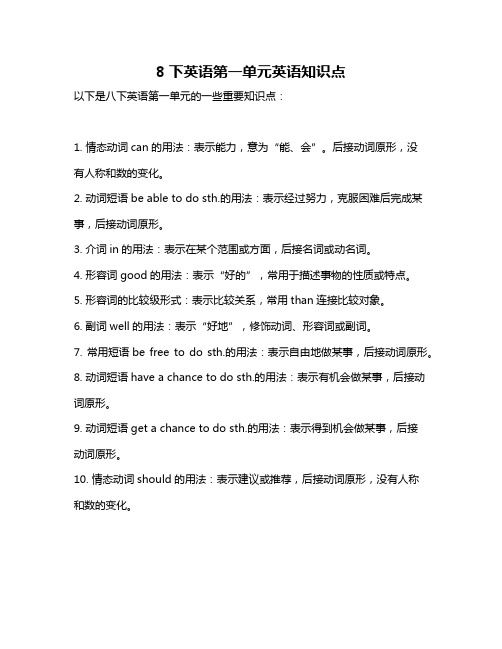
8下英语第一单元英语知识点
以下是八下英语第一单元的一些重要知识点:
1. 情态动词can的用法:表示能力,意为“能、会”。
后接动词原形,没
有人称和数的变化。
2. 动词短语be able to do sth.的用法:表示经过努力,克服困难后完成某事,后接动词原形。
3. 介词in的用法:表示在某个范围或方面,后接名词或动名词。
4. 形容词good的用法:表示“好的”,常用于描述事物的性质或特点。
5. 形容词的比较级形式:表示比较关系,常用than连接比较对象。
6. 副词well的用法:表示“好地”,修饰动词、形容词或副词。
7. 常用短语be free to do sth.的用法:表示自由地做某事,后接动词原形。
8. 动词短语have a chance to do sth.的用法:表示有机会做某事,后接动词原形。
9. 动词短语get a chance to do sth.的用法:表示得到机会做某事,后接
动词原形。
10. 情态动词should的用法:表示建议或推荐,后接动词原形,没有人称
和数的变化。
以上是八下英语第一单元的一些重要知识点,通过熟练掌握这些知识点,有助于提高英语语言能力。
人教版八年级下英语各单元重点单词短语句型默写

人教版八年级下英语各单元重点单词短语句型默写人教版八年级下英语各单元重点单词短语句型默写目录人教版八年级下英语各单元重点单词短语句型默写 (1)Unit 1 What's the matter? (1)Unit 2 I'll help to clean up the city parks. (2)Unit 3 Could you please clean your room? (4)Unit 4 Why don't you talk to your parents? (5)Unit 5 What were you doing when the rainstorm came? (7) Unit 6 An old man tried to move the mountains. (8)Unit 7 What's the highest mountain in the world? (10) Unit 8 Have you read Treasure Island yet? (11)Unit 9 Have you ever been to a museum? (13)Unit 10 I've had this bike for three years. (14)Unit 1 What's the matter?一、重点单词默写1. 问题;事情_________2. 胃痛_________3. 脚;足_________4. 脖子_________5. 喉晚_________6. 发烧_________7. 咳漱_________ 8. 牙痛_________9. 头痛_________ 10. 间歇;休息_________11. 乘客_________ 12. 问题;苦恼_________13. 她自己_________ 14. 生病的_________15. 膝盖_________ 16. 我们自己_________17. 登山者_________ 18. 危险;冒险_________19. 情况;状况_________ 20. 小刀_________21. 岩石_________ 22. 血_________23. 意思是;打算_________ 24. 重要性;重要_________25. 决定;抉择_________ 26. 限制;约束_________27. 勇气;意志_________ 28. 死;死亡_________29. 护士_________二、重点短语默写1. 喝够水_________2. 说得太多_________3. 喉咙疼_________4. 躺下来休息_________5. 喝蜂蜜热水_________6. 牙疼_________7. 看牙医_________ 8. 量体温_________9. 放些药在上面_________ 10. 躺在路边_________11. 心脏病_________ 12. 期待某人做某事_________13. 让某人惊奇的是_________ 14. 同意做某事_________15. 睡会儿觉_________ 16. 打到头_________17. 习惯做某事_________ 18. 用完了_________19. 继续(做)某事_________ 20. 放弃(做)某事_________三、重点句型默写1. 怎么了?________________________________________________________________ ______________________ 2. Ben怎么了?________________________________________________________________ ______________________ 3. 你发烧了吗?________________________________________________________________ ______________________ 4. 他牙疼吗?________________________________________________________________ ______________________ 5. 她应该怎么办?______________________________________________________________________________________ 6. 我可以在上面放些药吗?________________________________________________________________ ______________________ 7. 你踢球的时候弄伤了自己吗?________________________________________________________________ ______________________ 8. 你应该回家休息。
人教版八年级下册英语第一单元

人教版八年级下册英语第一单元一、重点单词。
1. matter.- n. 问题;事情。
例如:What's the matter?(怎么了?)- v. 重要;要紧;有关系。
例如:It doesn't matter.(没关系。
)2. stomachache n. 胃痛;腹痛。
例如:He has a stomachache.(他胃痛。
)3. foot n. 脚;足(复数形式为feet)。
例如:My feet hurt.(我的脚疼。
)4. neck n. 颈;脖子。
例如:She has a pain in her neck.(她脖子疼。
)5. fever n. 发烧。
例如:He has a high fever.(他发高烧。
)6. lie.- v. (lay, lain)躺;平躺。
例如:You should lie down and rest.(你应该躺下休息。
)- v. 说谎(lied, lied)。
例如:Don't lie to me.(别对我撒谎。
)7. rest.- v. & n. 放松;休息。
例如:Let's have a rest.(让我们休息一下。
)8. cough.- v. 咳嗽。
例如:He coughs a lot.(他咳嗽得很厉害。
)- n. 咳嗽。
例如:She has a bad cough.(她咳嗽得很厉害。
)9. X - ray n. X射线;X光。
例如:The doctor took an X - ray of his leg.(医生给他的腿拍了X光片。
)10. toothache n. 牙痛。
例如:I have a terrible toothache.(我牙痛得厉害。
)二、重点短语。
1. have a cold 感冒。
例如:I have a cold. I feel terrible.(我感冒了。
我感觉很糟糕。
)2. have a stomachache 胃痛。
八年级英语下册第一单元重点句型汇总(人教版)

八年级英语下册第一单元重点句型汇总(人教版)【重点句型】1.what'sthematterwithyou?=what'thetroublewithyou?=what'swrongwithyou?你怎么了?2.whatshouldshedo?她该怎么办呢?3.ShouldItakemytemperature?我应该量一下体温吗?4.youshouldliedownandrest.你应该躺下休息一会儿。
5.Doyouthinkitcomesfromanewspaperorabook?你认为它是来自报纸还是书呢?6.IthinkIsatinthesamewayfortoolongwithoutmoving.我想我以同样的姿势一动不动地坐得太久了。
7.Shesaidthatthemanhadaheartproblemandshouldgotothe hospital.她说这个人有心脏病应该去医院。
基础知识1.what’sthematter?怎么啦?出什么事情了?【解析】matter/'mætə)/n.问题;事情what’sthematterwithyou?=what’sthetroublewithyou?=what’swrongwithyou?你怎么了?【注】:matter和trouble为名词,其前可加the或形容词性物主代词,wrong是adj.不能加the【用法】用于询问某人有什么病或某人遇到什么麻烦、问题其后跟询问对象时,与介词with连用。
即:what’sthematterwithsb.?=what’syourtrouble?=what’sup?=whathappenstosb.?—what’sthematterwithyou?—Ihaveabadcold.2.Ihadacold.我感冒了。
haveacold=catchacold=havetheflu感冒haveafever发烧haveacough咳嗽haveastomachache胃疼,肚子疼haveatoothache牙疼haveaheadache头疼3.身体部位+ache(疼痛)构成新的复合词stomach+ache=stomachachehead+ache=headachetooth+ache=toothacheback+ache=backache后背痛4.muchtoo+形容词,意为太......,toomuch+名词,意为很多,大量。
八年级英语下册第一单元重点句型汇总(人教版)

八年级英语下册第一单元重点句型汇总(人教版)【重点句型】1hat'stheatterithu?=hat'thetrubleithu?=hat'srngithu?你怎么了?2hatshuldshed?她该怎么办呢?3ShuldItaeteperature?我应该量一下体温吗?4ushuldliednandrest你应该躺下休息一会儿。
Duthinitesfranespaperrab?你认为它是来自报纸还是书呢?6IthinIsatinthesaeafrtlngithutving我想我以同样的姿势一动不动地坐得太久了。
7Shesaidthattheanhadaheartprbleandshuldgtthehspital 她说这个人有心脏病应该去医院。
基础知识1hat’stheatter?怎么啦?出什么事情了?【解析】atter/'ætə)/n问题;事情hat’stheatterithu?=hat’sthetrubleithu?=hat’srngithu?你怎么了?【注】:atter和truble为名词,其前可加the或形容词性物主代词,rng是ad不能加the【用法】用于询问某人有什么病或某人遇到什么麻烦、问题其后跟询问对象时,与介词ith连用。
即:hat’stheatterithsb?=hat’surtruble?=hat’sup?=hathappenstsb?—hat’stheatterithu?—Ihaveabadld2Ihadald我感冒了。
haveald=athald=havetheflu感冒haveafever发烧haveaugh咳嗽haveastahahe胃疼,肚子疼haveatthahe牙疼haveaheadahe头疼3身体部位+ahe(疼痛)构成新的复合词stah+ahe=stahahehead+ahe=headahetth+ahe=tthaheba+ahe=baahe后背痛4uht+形容词,意为太,tuh+名词,意为很多,大量。
- 1、下载文档前请自行甄别文档内容的完整性,平台不提供额外的编辑、内容补充、找答案等附加服务。
- 2、"仅部分预览"的文档,不可在线预览部分如存在完整性等问题,可反馈申请退款(可完整预览的文档不适用该条件!)。
- 3、如文档侵犯您的权益,请联系客服反馈,我们会尽快为您处理(人工客服工作时间:9:00-18:30)。
八年级英语下册第一单元重点句型汇总(人教版)八年级英语下册第一单元重点句型汇总(人教版)【重点句型】1.What’stheatterwithyou?=What’thetroublewithyou? =What’swrongwithyou?你怎么了?2.Whatshouldshedo?她该怎么办呢?3.ShouldItaeyteperature?我应该量一下体温吗?4.youshouldliedownandrest.你应该躺下休息一会儿。
5.Doyouthinitcoesfroanewspaperoraboo?你认为它是来自报纸还是书呢?6.IthinIsatinthesaewayfortoolongwithoutoving.我想我以同样的姿势一动不动地坐得太久了。
7.Shesaidthattheanhadaheartprobleandshouldgototheho spital.她说这个人有心脏病应该去医院。
基础知识1.What’stheatter?怎么啦?出什么事情了?【解析】atter/’ætə(r))/n.问题;事情What’stheatterwithyou?=What’sthetroublewithyou?=What’swrongwithyou?你怎么了?【注】:atter和trouble为名词,其前可加the或形容词性物主代词,wrong是adj.不能加the【用法】用于询问某人有什么病或某人遇到什么麻烦、问题其后跟询问对象时,与介词with连用。
即:What’stheatterwithsb.?=What’syourtrouble?=What’sup?=Whathappenstosb.?—What’stheatterwithyou?—Ihaveabadcold.2.Ihadacold.我感冒了。
haveacold=catchacold=havetheflu感冒haveafever发烧haveacough咳嗽haveastoachache胃疼,肚子疼haveatoothache牙疼haveaheadache头疼3.身体部位+ache(疼痛)构成新的复合词stoach+ache=stoachachehead+ache=headachetooth+ache= toothachebac+ache=bacache后背痛4.uchtoo+形容词,意为太......,toouch+名词,意为很多,大量。
5.enough【形容、副词】足够的/地,enough放在名前后,形副后。
goodenough足够好,enoughoney=uchoney6.liedown躺下,lie躺,躺着,过去式lay;lie说谎,过去式lied7.aybe“或许”,常用于句首,表示可能性,后加句子。
aybeyouareright.aybe,是情态动词+be的结构,意为“可能,也许”,后加名词、代词或形容词。
Heaybeangry.soundlie+名词代词和从句:Itsoundslieyoudon’tnowthetruth.Itsoundslieagoodidea.sound+形容词,“听起来,好像”,Theusicsoundsnice.9.need需要,实义动词need+名词,需要某物;needtodosth.需要做某事,主语通常是人,表示人主动的动作:youneedtolistencarefullyduringclass.needdoingsth.主语通常是物,表示被动的动作:yourdirtyclothesneedwashing.10.getoff(thebus)下(公交车)geton上车11.agree同意,赞同;agreewithsth.同意某事如:Iagreewiththatidea.agreetosb.同意某人的意见如:IagreetoLiLei.12.trouble问题,麻烦;beintrouble遇到麻烦,aetrouble制造麻烦,havetrouble(in)doingsth.=havedifficulties(in)doings th做......有麻烦。
13.rightaway=rightnow=atonce,意为马上。
14.advice[不可数名词]劝告,建议,向…征求意见,givesb.adviceonsth.就某事给某人建议;advise[动词] advisesb.todosth.建议某人做某事advisesb.doingsth.advisesb.todosth.和advisesb.doingsth.的区别advise的用法搭配有两种:advisesb.todosth建议某人做某事advisedoingsth.建议做某事如:Headvisedgoingtotheovie.他建议去看电影.Headvisedustogototheovie.他建议我们去看电影.请看下面这道题,该选哪个答案?是advisedoing还是advisetodo?Thehusbandadvised_________tothesouth,buthiswifeadvi sedhi_________uptheidea.A.oving,givingB.toove,togivec.oving,togiveD.toove,g iving【分析】此题容易误选A,因为许多学生都记住了“advise后接动词要用动名词而不用不定式”这一搭配规则。
但此“规则”的表述是不准确的,准确的说法应该是:advise后接动词作宾语时,要用动名词,不用不定式;但若其后接的动词前有宾语,此动词用作宾语补足语时,则此动词要用不定式。
即说advisedoingsth(建议做某事)或advisesbtodosth(建议某人做某事)。
类似情况的还有allow(允许),perit(允许),forbid(禁止)等动词,即:allowdoingsth允许做某事,allowsbtodosth允许某人做某事;peritdoingsth允许做某事,peritsbtodosth允许某人做某事;forbiddoingsth禁止做某事,forbidsbtodosth禁止某人做某事。
顺便说一句,要特别注意以上各句型后一结构的被动语态形式,如:Wedon’tallowsoinginthelab.我们不准在实验室吸烟。
Wedon’tallowpeopletosoeinthelab.我们不准人们在实验室吸烟。
Peoplearenotallowedtosoeinthelab.人们不准在实验室吸烟。
重要语法点一、询问某人的健康问运及遭到麻烦的表达方法(1)询问某人患了何种疾病或遇到了何种麻烦时,常用以下几种结构来表达:What’stheatter(withsb.)?(某人)怎么了?What’swrong(withsb.)?(某人)怎么了?What’sthetrouble(withsb.)?(某人)出什么事了? Whathappened(tosb.)?(某人)发生了什么事?Areyouo?你没事吧?Isthereanythingwrongwithsb.?某人有什么事吗?(2)要表达身体疼痛或不舒服,可用以下结构:1.某人+have/has+病症.Thetwinshavecolds.双胞胎感冒了。
2.+have/has+a+headache/toothache/stoachache/bacache /earache.Shehadastoachachelastnight.她昨晚肚子痛。
3.某人+have/has+a+sore+发病部位.Hehasasorethroat.他喉咙痛。
4某人+hurt(s)+身体部位或反身代词.Hehurthisleg.他的腿受伤了。
5某部位+hurt(s).yheadhurtsbadly.我头痛得厉害。
6某人+have/has+apain+inone’s+身体部位,Ihaveapaininychest.我胸口痛。
7.(Thereis)soethingwrongwithone’s+身体部位.Thereissoethingwrongwithyrighteye..我的右眼有毛病。
8.其他表达方式Shehasahearttrouble.她有心脏病。
Hegothitonthehead他头部受到了撞击。
Shecutherfinger.她割破手指了。
二情态动词should的用法1.Should为情态动词,意为“应该;应当”,否定式为shouldn’t,其后接动词原形,无人称和数的变化。
常用来表示征询意见、建议、劝告、要求或义务等。
youshoulddrinhotwaterwithhoney.你应该喝加有蜂蜜的开水。
Heshouldputhisheadbac他应该把头后仰。
Weshouldtryourbesttohelphi.我们应当尽力去帮助他。
youshouldn‘twatchTV.你不应该看电视。
2.Should用于主语为第一人称的疑问句,表示征询意见。
ShouldIputsoeedicineonit?我应当给它敷上药吗?Shouldwetellheraboutit?我们应该告诉她这件事吗?【拓展】在英语中,表示建议的说法有很多,而且都是中考考查的重点。
主要结构有:①Wouldyoulie(todo)sth.?你想要/愿意(做)某事吗?Wouldyoulietoplaybasetballwithe?你想要和我一起打篮球吗?②ShallI/wedosth?我/我们做……好吗?Shallwegotothezootoorrow?明天我们去动物园,好吗?③Whynotdosth?为什么不……呢?Whynotjoinus?为什么不加入到我们当中来呢?④How/Whataboutdoingsth?做某事怎么样?Howaboutgoingswiing?去游泳怎么样?⑤Let’sdosth让我们做……吧。
Let’sgohoe.咱们回家吧。
⑥you’dbetter(not)dosth你最好(不)要做某事。
you’dbetternotgotherealone.你最好不要一个人去那儿。
【话题•谈论健康和事故】谈论自己的健康,发生事故时怎么做及如何向他人提出建议和劝告,从而养成良好的饮食和生活习惯。
具体到书面表达中要求同学们掌握描述人体的不适,并提出正确的建议。
Lastwee,Igotsic.onWednesday,Ihadacold,butIstillwent toschool.onThursdayorning,Ihadafever.yothertooetoseeadoctorinReninHospital.ThenwewentbachoeandIhadsoec hicensoup.yothersaidchicensoupwasverygood.onFriday, Istayedinbedandhadagoodrest.onSaturday,Ifeltuchbett er.。
